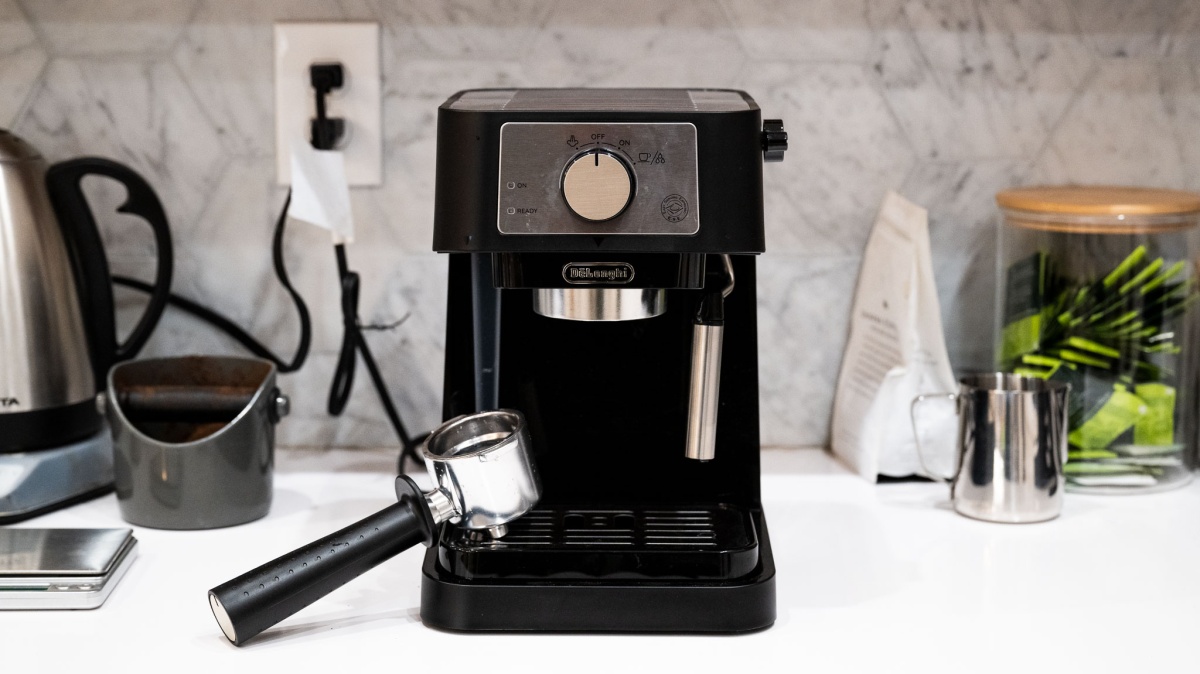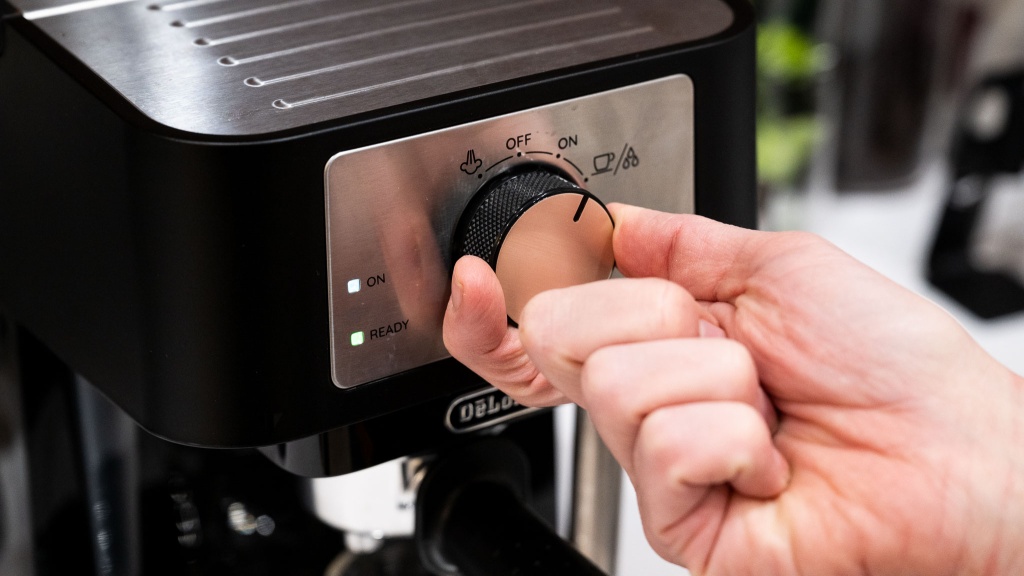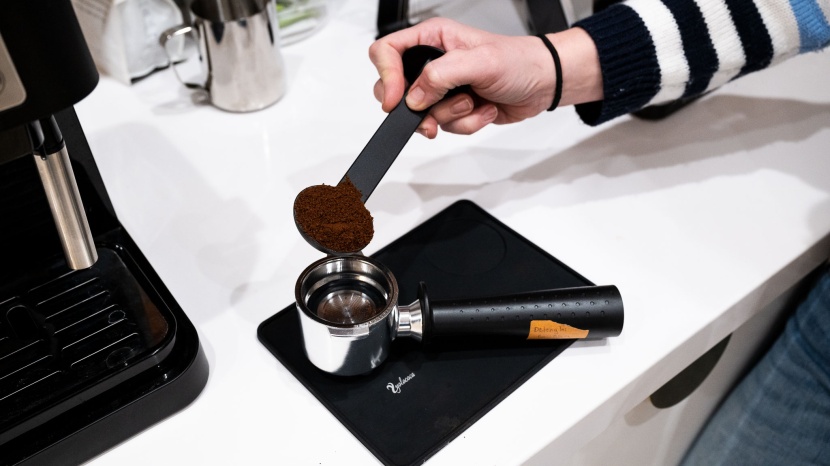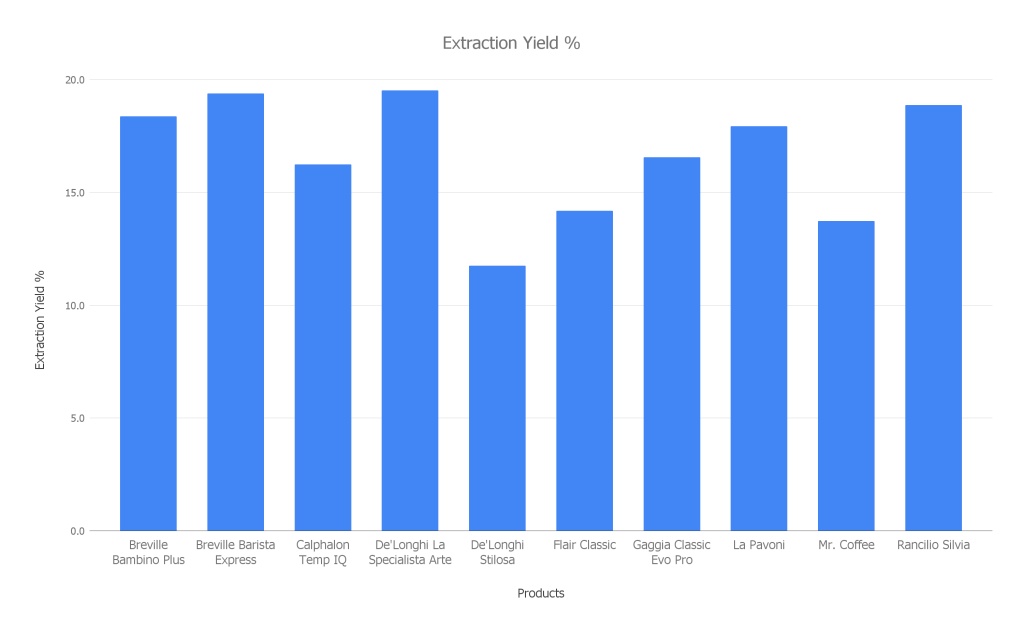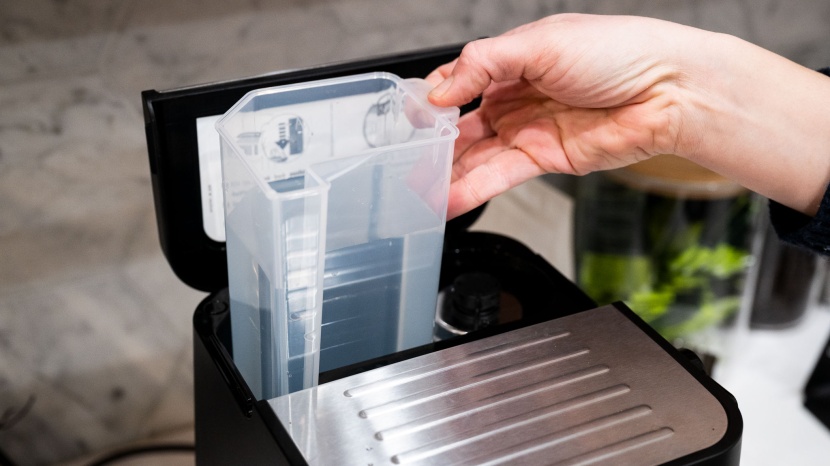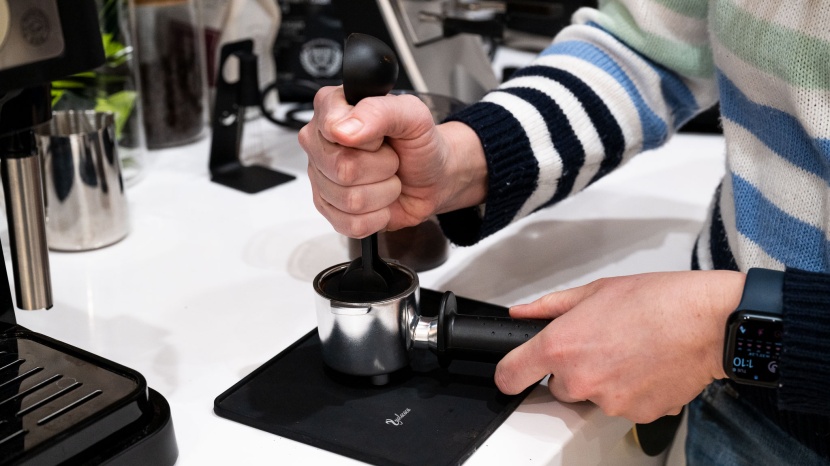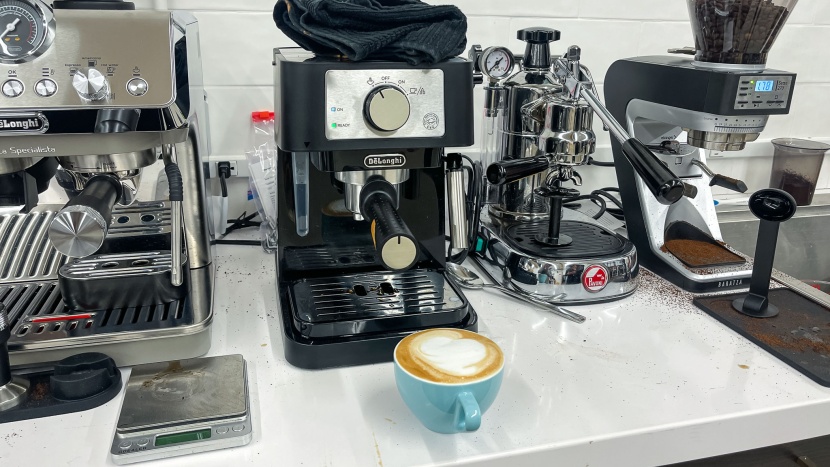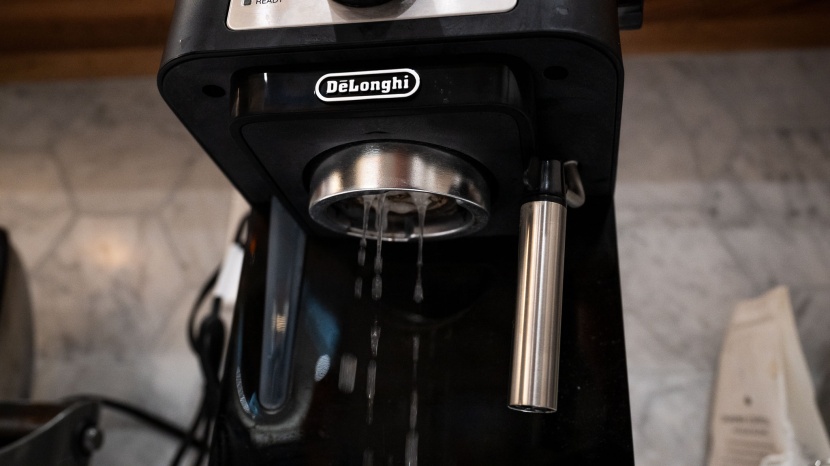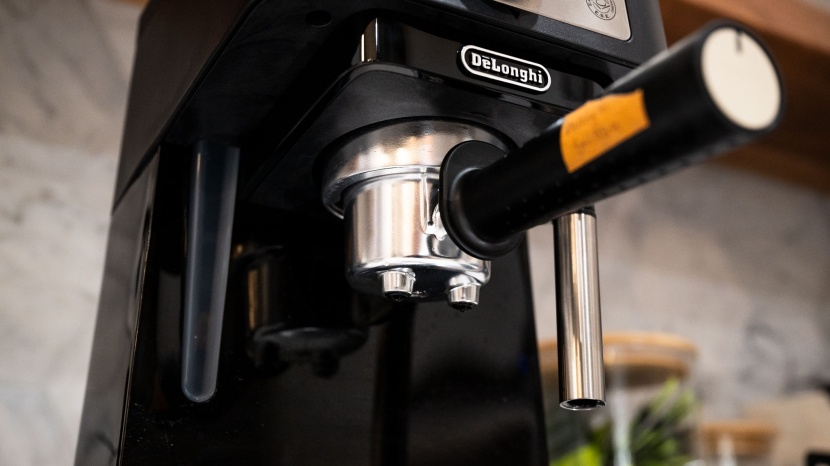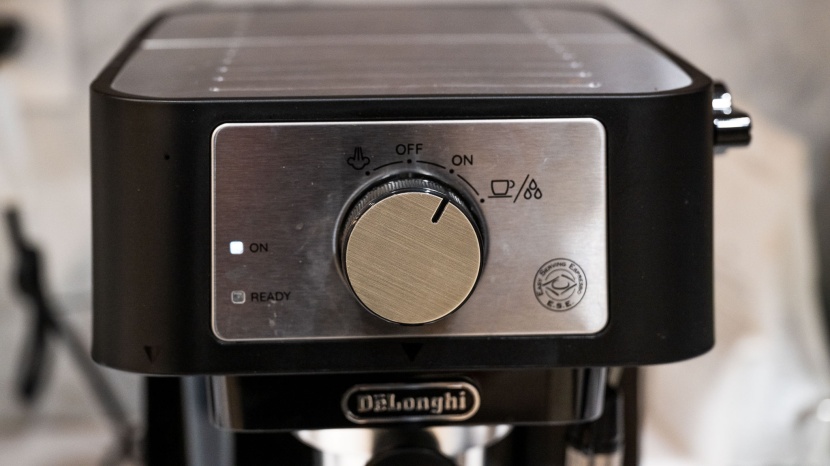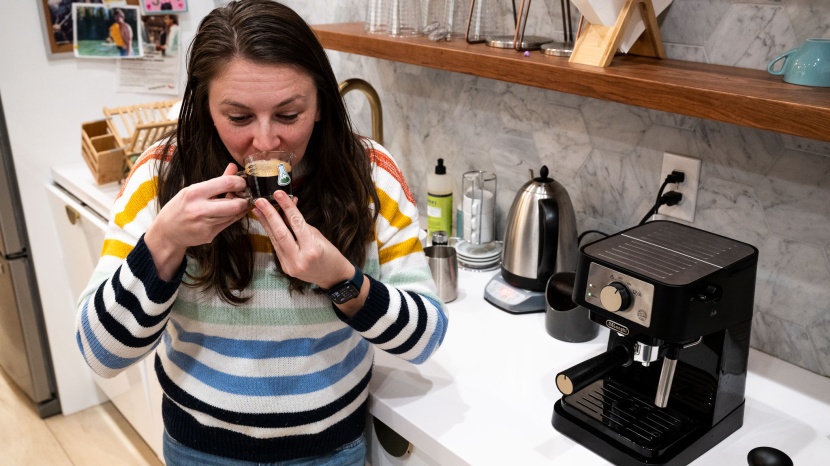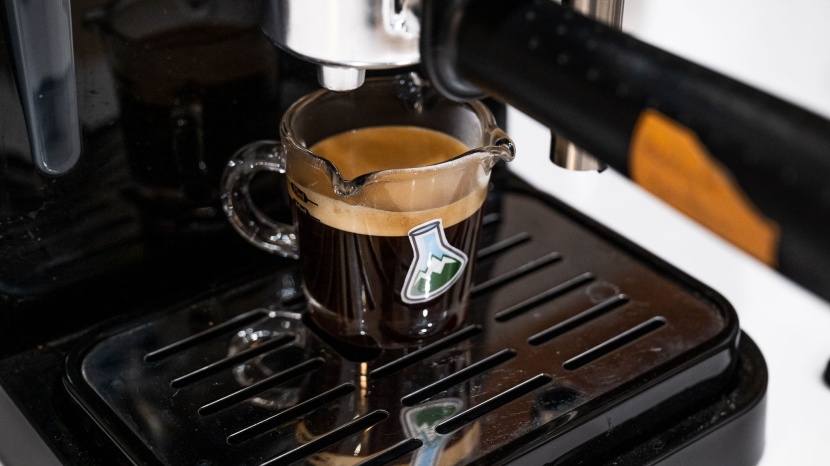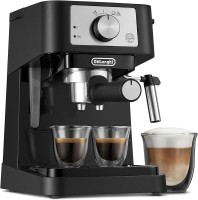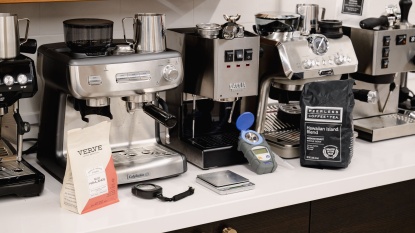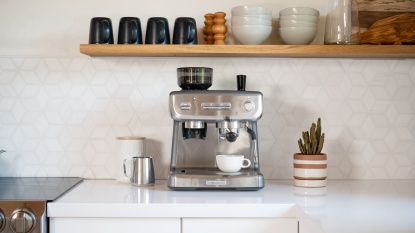
Our Verdict
Our Analysis and Test Results
The De'Longhi Stilosa will jump out as an affordable alternative to many of the expensive espresso machines in the class. However, this device makes so-so espressos and cappuccinos due to its thin, bitter brew and subpar steamed milk. Far from perfect, this machine can still perform the basics and will appeal to those who want to save a buck.
Espresso Quality
Our espresso metric looks at the quality of the shots pulled from the machine and the ability to customize the coffee extraction method. The Stilosa did not fare well in this evaluation largely due to its limited adjustability and small baskets.
We use a panel of expert baristas to give us feedback on the quality of the shot, its balance of flavors, its consistency, and its mouthfeel. We also look at the ability to adjust the coffee dose, the water ratio, preinfusion, and pressure. During our tests, the Stilosa took 15 seconds to turn 15 grams of grounds into 27 grams of liquid — less than desirable results. Additionally, we used a refractometer to measure the total coffee density of each of the Stilosa's shots.
Based on results from our refractometer tests, the Stilosa produced a very thin brew with an extraction yield of just 11.8% (industry standards for espresso are 18% to 22%). This yield basically shows how much coffee made it through the extraction process and into your cup. The Stilosa's results were one of the lowest of all the machines in our current lineup.
The espresso pulled from the Stilosa is on the weak side because of the limited grounds that the machine can process at a time (15-gram max). Exacerbating this issue is that the water passing through the puck isn't evenly distributed, making for irregular extraction. As a result, the espresso is watery and bitter-tasting. We also found the crema to be thin and composed of larger bubbles that quickly dissipated. The machine does not allow the user to adjust to the pressure and to pre-infuse the grounds. That said, one can adjust the water ratio, but this adjustment rendered only minor improvements in shot quality.
Ease of Use
Confusing setup instructions, a less-than-stellar user manual, and so-so cappuccino production earned the Stilosa average and below-average scores for this metric. Luckily, a simple knob makes the interface quite simple to use.
The Stilosa is easy to set up; however, thanks to vague instructions, you're left to figure a lot of it out with your own brainpower. The overall process is simple, but it still took 25 minutes (one of the longest setups) because we were often left guessing. On the positive side, the water tank is easy to fill. Simply pull out the tank, fill it with water, and reinsert it. This may seem mundane, but some models are difficult to fill without making a mess. The only bummer is the tank's capacity. It holds just 34 ounces, about half of the capacity of most of the machines in our lineup.
We also like that the unit has an adjustable tray height to accommodate varying cup sizes. Yet, the clearance is still limited and requires us to remove the tray to fit a standard coffee cup. Finally, the Stilosa takes a bit more time to heat up than other units in the class, but we were still able to produce a cappuccino in 2 minutes and 48 seconds.
As previously mentioned, the baskets can't hold a lot of coffee. The double shot basket struggled to hold 15 grams of coffee with a fine grind. As we were dialing in the machine, we needed a coarser grind, which meant less coffee fit in the basket and resulted in a weaker cappuccino.
Lastly, this machine has a major hiccup when it comes to its overall production process. The manufacturer recommends not switching back and forth between coffee and steaming milk. So, if you're making multiple cappuccinos, you're required to pull all of the espresso first and then steam all the milk. When reversing the process, we also found that the machine needed to cool down after steaming or it would burn the coffee.
In the end, if you are okay with basic performance levels and are willing to look past this machine's drawbacks, the Stilosa still boasts a very appealing price point. Our calculations show that through consistent use, it will also save you more money over its lifetime.
Ease of Cleaning
Most espresso makers have daily, weekly, and semi-annual cleaning requirements — the Stilosa is no different. While the Stilosa isn't a breeze to clean, its requirements are about average for the class. It scored lower in this metric for its relatively lengthy descaling process and a more-intense weekly cleaning routine.
The daily cleaning of the Stilosa is pretty basic: clean the puck out of the portafilter and rinse it and the basket. Cleaning the steam wand is also made easy as the outer part of the wand is easily removable. Our only complaint is that getting the espresso puck out was a bit hard. But, aside from that, the cleaning is straightforward. However, its long-term maintenance is a little more involved. After 200 shots, the manufacturer recommends thoroughly cleaning the filter baskets and completely disassembling and rinsing all components. Descaling is also recommended after 200 shots. The 15.5-minute process (longer than some machines) requires a proprietary cleaning solution, and the user must be next to the machine during the entire process. We found the descaling instructions to be a bit vague, forcing us to guess on the amount of descaling solution to use.
Milk Steaming
If you're looking to make cappuccinos, you'll be interested in the milk quality metric. As the name implies, this assessment examines microfoam production and steam wand consistency. In short, the Stilosa has a lot of room for improvement.
Steaming milk for lattes is not a problem for the Stilosa, but don't expect much more in terms of rich microfoam for cappuccinos. During our steaming tests, our best results were heated milk with big bubbles that quickly faded away. Our analysis showed the steam to be hot enough, but its pressure is not consistent enough to produce rich foam. Additionally, the Stilosa's steam wand is too large in diameter, which results in a fair amount of chaos in the milk pitcher, so you'll need to be careful not to spill your milk while steaming it.
Machine Customization
When it comes to fine-tuning your process, the Stilosa doesn't offer many options for tailoring to your preferences, which is why it didn't score well in this metric. That said, this machine is inexpensive, so it certainly doesn't offer the same bells and whistles that more pricey models bring to the table.
Several things influenced the score we assigned to the Stilosa. The filter baskets are way too small. It lacks a pre-infusion process and doesn't allow for any control over the pressure of the final infusion. Temperature cannot be controlled, which greatly affects how the machine brews different types of roasts. This lack of temp control also doesn't accommodate user preferences for hotter or cooler brews. In fact, the only advice the instruction manual offers for hotter coffee is to preheat the portafilter and cup. It also suggests repeating the machine's heating process twice (instead of once) before brewing — not an ideal procedure.
Should You Buy the De'Longhi Stilosa?
If you're looking for top-tier quality, this is not your espresso machine. While its cost is certainly competitive, it's important to consider the lower espresso quality that is inherent with a machine at this price point. But, if you're espresso-curious and don't want to drop hundreds of dollars just yet, this unit is great for dipping your toes in without paying a premium.
What Other Espresso Machines Should You Consider?
Those who want to make a high-quality espresso should consider a high-quality machine like the Breville Barista Express or the Rancilio Silvia. The Barista Express is another great option for beginners, as it includes a built-in grinder and has some automated components. The Rancilio Silva is another unit that offers high-quality espresso and lots of customization options for seasoned baristas. The Breville Bambino is about twice as much as the Stilosa, but it produces far superior espresso and milk creations at a more reasonable price than our most expensive machines. For an affordable option that is easy to use and brews a decent shot, consider the Casabrews CM5418.
| Awards | |
|---|---|
| Price | $150 List Check Price at Amazon |
Overall Score  |
|
| Star Rating | |
| Bottom Line | A great option for anyone on a tight budget who doesn't mind sacrificing milk quality in order to get a good deal |
| Pros | Inexpensive, easy to operate, small footprint |
| Cons | No automation, slow to heat up |
| Rating Categories | De'Longhi Stilosa |
| Espresso Quality (40%) | |
| Ease of Use (20%) | |
| Ease of Cleaning (15%) | |
| Milk Steaming (15%) | |
| Machine Customization (10%) | |
| Specifications | De'Longhi Stilosa |
| Lifetime Cost Per Shot | $0.59 |
| Number of Cafe Replacement Lattes to Make Up List Price | 29 |
| Measured Dimensions | 8.1" x 10.2" x 11.4" |
| Measured Cup Clearance | 4.2" |
| Pre-Infusion | No |
| Cappuccino Time | 2 min 48 sec |
| Number of Cafe Replacement Shots to Make Up List Price | 49 |
| Portafilter Size | 51 mm |
| Steam Wand | Yes |
| Measured Water Tank Capacity to Max Fill | 34 oz |
| Integrated Pressure Gauge | No |
| Hot Water Delivery | Steam Wand |
| Extraction Yield | 12% |
| PID Temperature Control | No |
| Included Accessories | Combo Tamper and Coffee scoop 2 Filter Baskets |
| Setup Time | 25 min |


